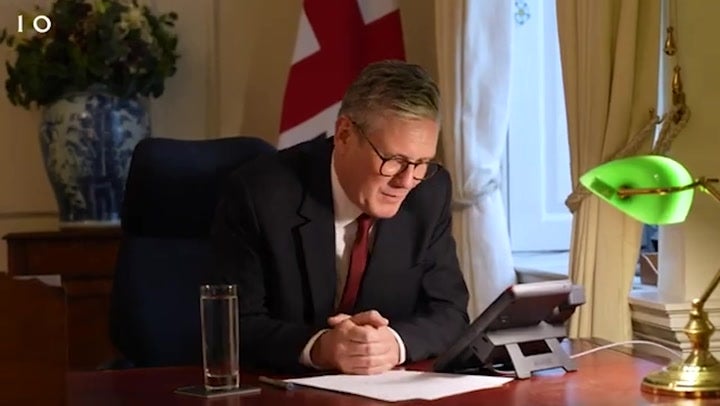Keir Starmer’s biggest test will happen on the international stage
Editorial: Starmer has been provided with the most propitious foreign policy start that any new UK government has had for many years

It was a judicious decision on the part of Sir Keir Starmer to make his first travels as prime minister a whistle-stop tour of the devolved capitals of the UK. This not only sets a clear one-nation tone for relations between the new government and the home nations, but clearly signals the importance of the home front – which is a useful message to send out at the start of two weeks in which foreign policy will loom unusually large.
On Tuesday, Sir Keir will fly to Washington to take his place at the 75th anniversary summit of Nato in Washington, which is set to include a one-to-one meeting with the US president. It is no more than a happy accident that the timing of the Nato summit hands this prime minister the early White House meeting that many British prime ministers have to work hard to secure. But good fortune is to be embraced, not scorned.
A week later, on the day after the state opening of parliament, Sir Keir will host the fourth summit of the 47-member European Political Community (EPC) – in the august surroundings of Blenheim Palace. The two-year-old group was the brainchild of the French president, Emmanuel Macron, and the former prime minister Rishi Sunak had offered the venue, but it is the new Labour prime minister who will be the diplomatic beneficiary.
The conjunction of these two major international gatherings within barely two weeks of the new government’s taking office presents Sir Keir with unparalleled opportunities both to meet the UK’s allies, friends and neighbours, and for them to meet him. It is to be hoped that, despite the short time for preparation, he will be able to use them to good effect – eschewing, for instance, the UK’s habitual demands to “take the lead” and adopting a collegiate approach that matches the “middle-power” status and “progressive realism” identified by the new foreign secretary, David Lammy, as the lodestars of Labour’s foreign policy.
Not only are the timing of the election and how it dovetails with the international calendar advantageous to the new prime minister, but so too, in many ways, is the international context. After years of political turmoil that can be dated from the Brexit referendum and what has seemed an ever-changing cast of prime ministers, the UK suddenly looks like one of the more sane and sensible players on the international field.
The Labour Party swept to power with a big overall majority, and Sir Keir has already established an air of calm and efficiency at the top. There suddenly seems to be a prospect, barring accidents and disasters, of a period of stability and being able to look several years ahead.
Contrast this with our nearest big neighbours, France and Germany, both of whose governments were destabilised by the results of the recent EU elections. President Macron now faces having to work with – at best – a hung parliament and an opposition dominated by the far right, while the coalition of chancellor Olaf Scholz looks fragile, with a change forecast at next year’s elections.
Contrast this, too, with the EU itself, which is still in the throes of sharing out jobs following those EU elections, and indeed with the state of play in the US, where president Joe Biden faces growing pressure to abandon his bid for re-election – and where, even if he does run, the alternative is Donald Trump.
None of this means that dealing with the outside world will be plain sailing for the new prime minister. Volatility elsewhere, especially in France, will be a complicating factor. Early tensions could emerge at the Nato summit, where celebrations of an alliance that has lasted 75 years could be overshadowed by differences about levels of help for Ukraine and when, or even whether, Ukraine might join the alliance.
Similar divisions could also be evident at the EPC summit. European solidarity with Ukraine is not quite as iron-clad as it once was, and will not have been strengthened by a so-called peace mission to Moscow mounted by the Hungarian prime minister, Viktor Orban, within days of Hungary taking over the presidency of the EU.
The EPC countries, which include all EU members and Turkey, have also been split over the war in Gaza, where some harbour hopes that the new UK government could make a positive contribution to a future peace, given its UN Security Council seat. But the Labour government is in a bind here, with its plan for early official recognition of the State of Palestine reportedly opposed by the US, yet Palestine being a totemic issue for many Labour MPs. The dynamics of the new parliament, which includes several independent pro-Palestine MPs, have yet to be seen in action.
And these are just the urgent international questions facing the new government. Others on the horizon will demand equally delicate judgements, including how to go about improving relations with the EU, balancing the risks and opportunities in dealings with China; whether the new president could make Iran easier to engage, and how far to prepare for possible change in Moscow. Addressing the concerns of the so-called global south is something the UK, via the Commonwealth, might seem well equipped to do, but where a Labour government is only a little less held back than a Conservative government by the new attention to colonialism.
In all, though, the international timetable and turmoil elsewhere are combining to provide Sir Keir with the most propitious foreign policy start that any new UK government has had for many years. It is an opportunity that he and his team must be careful not to squander.






Join our commenting forum
Join thought-provoking conversations, follow other Independent readers and see their replies
Comments